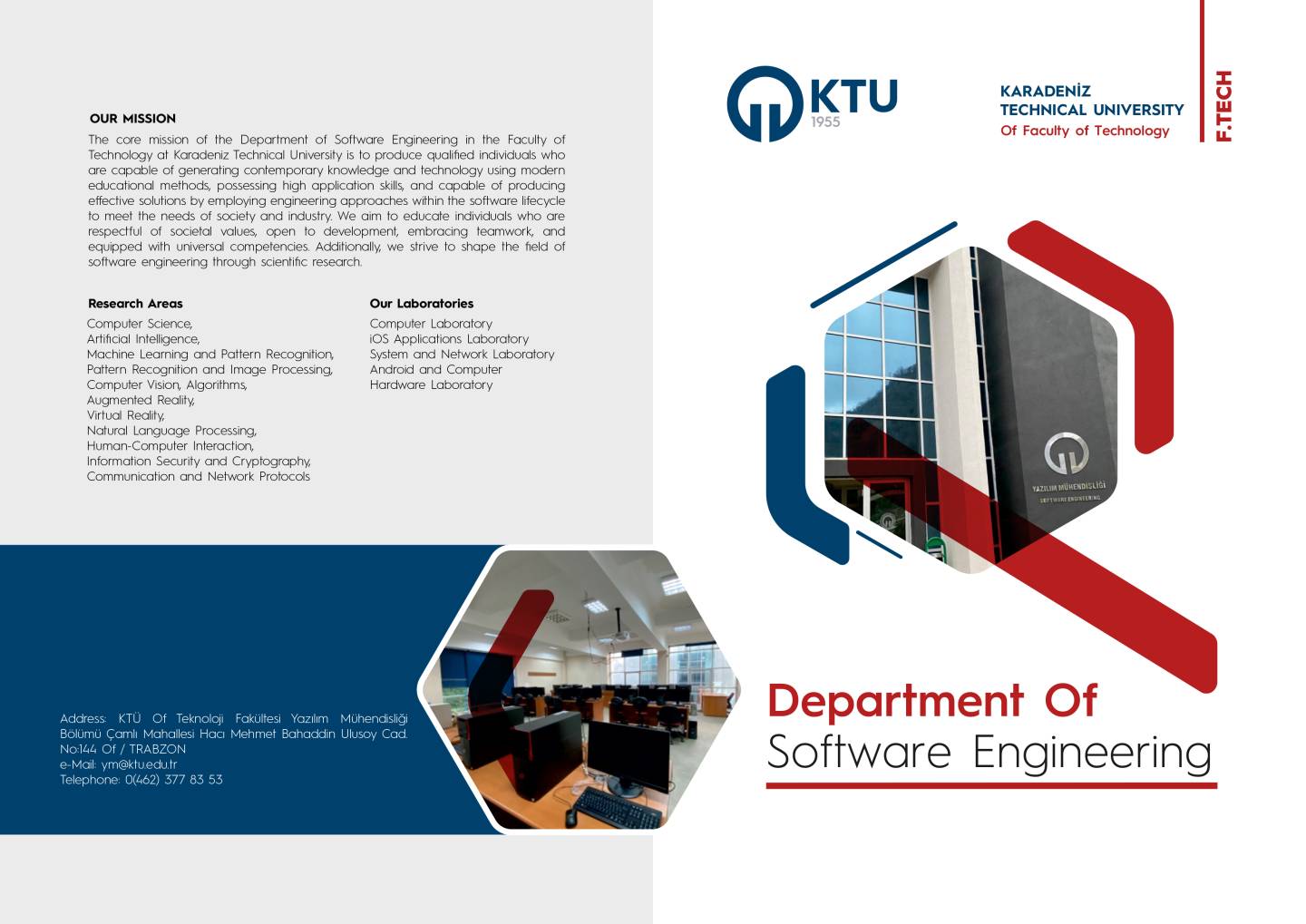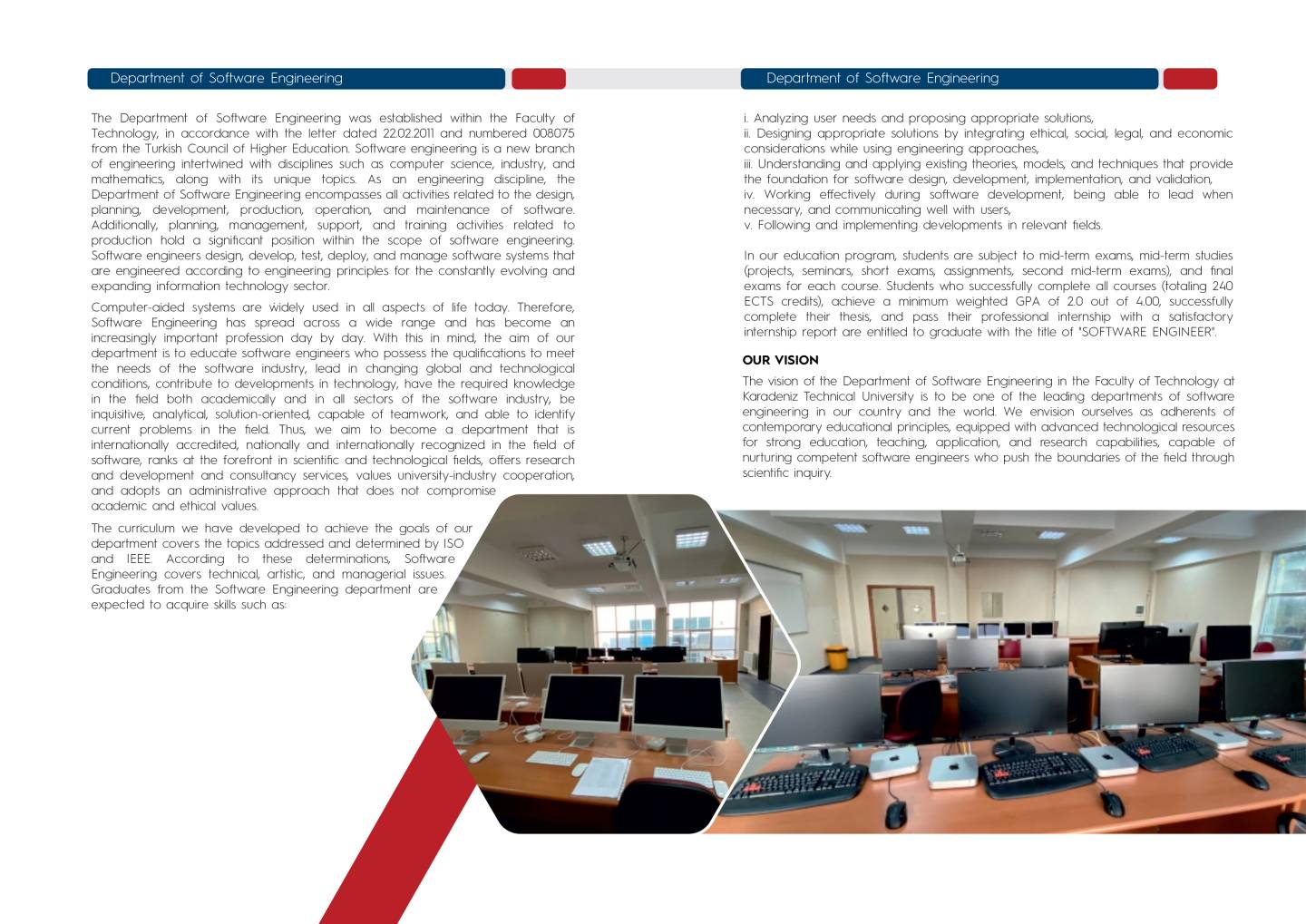

Computer-aided systems are used in every aspect of life today. Consequently, Software Engineering has become a widely spread and increasingly important profession. The goal of our department, established from this perspective, is to train software engineers who can meet the needs of the software industry, lead in changing world and technology conditions, contribute to technological advancements, possess contemporary knowledge relevant to their field in both academic and software industry sectors, and exhibit qualities such as being investigative, inquisitive, analytical, capable of teamwork, and able to identify current problems in the field. Thus, we aim to become a nationally and internationally recognized, scientifically and technologically leading, research and development, and consultancy-providing department that emphasizes university-industry collaboration and upholds academic and ethical values, achieving international accreditation.
Our program, designed to achieve our department's goals, encompasses topics addressed and determined by ISO and IEEE. According to these determinations, Software Engineering covers technical, artistic, and managerial subjects. Graduates from the Software Engineering department are expected to gain skills such as:
1. Analyzing user needs and proposing appropriate solutions.
2. Designing solutions that integrate ethical, social, legal, and economic considerations while using engineering approaches.
3. Understanding and applying existing theories, models, and techniques that provide the foundation for software design, development, implementation, and verification.
4. Working effectively during the software development phase, leading when necessary, and communicating well with users.
5. Following and applying developments in related fields.
In our education program, students are subjected to mid-term exams, coursework (projects, seminars, quizzes, homework, second mid-term), and final exams for each course.
Students who successfully complete all the courses in the program (totaling 240 ECTS credits), achieve a weighted grade point average of at least 2.0 out of 4.00, successfully complete their capstone project, and pass their professional internship and the internship report they prepared, are entitled to graduate with the title of SOFTWARE ENGINEER.
Our Educational Objectives
The subjects of software engineering have been addressed and determined by international standard organizations, ISO and IEEE. According to these determinations, the fields of Software Engineering encompass technical, artistic, and managerial topics.
The Department of Software Engineering aims to train software engineers who will work towards developing comprehensive software, critically needed by Turkey, in the most reliable manner within the country. This includes developing software for increasingly critical areas such as metro systems, airports, nuclear reactor management, defense, and similar fields with near-zero error. Training software engineers equipped with contemporary theoretical and practical knowledge in these areas is crucial for guiding the technology needed by the economy. Universities' software engineering departments have undertaken this mission. Moreover, one of the fundamental objectives of "Software Engineering" is to identify necessary data models and data structures to solve problems based on computer software from different disciplines.
Our Students
Our students maintain communication with international and national professional organizations and organize events by forming communities such as the KTÜ Software Club and various Student Clubs.
Our Academics
Our academic staff, in addition to teaching their courses, continue their scientific research through KTÜ BAP, TÜBİTAK, and SANTEZ projects that they conduct or are attempting to obtain. While efforts to apply for projects under EU framework programs continue, collaborations and partnerships with some universities abroad are also being established.
Our Departments
- Software Engineering Department
Internship Program
In addition to completing the required course credits, students of KTÜ Faculty of Technology must undertake internships (practical work) to enhance their practical knowledge and skills in accordance with the Internship Directive of the Faculty of Engineering at Karadeniz Technical University. This is mandatory to qualify for a bachelor's degree.
The total duration of internships (practical work) required for our students to graduate is 60 (sixty) working days. Students can undertake a minimum of fifteen (15) working days and a maximum of forty (40) working days of internship without interruption during an internship period (within one year covering two semesters). Through the internship program, our students can find internship opportunities in many institutions and companies both domestically and abroad.
Exchange Programs
The student exchange programs at our university are managed by the Coordination Office of Exchange Programs under the Office of External Relations. Exchange programs provide our students with the opportunity to receive education and undertake internships both domestically and abroad. The Coordination Office of Exchange Programs includes:
1. Erasmus+ Exchange Program Unit
2. Farabi Exchange Program Unit
3. Mevlana Exchange Program Unit
For detailed information about exchange programs, you can visit the Coordination Office of Exchange Programs page on our university's website.
Course Information
For Course Information Packages, Course Curricula, Course Compatibility Programs, and Course Catalogs of our department, please click here.
Laboratory and Application
As a department within our research university, we provide interdisciplinary research and application opportunities that allow our students to reinforce the theoretical knowledge gained during their education through practical experience.
The Department of Software Engineering at the Faculty of Technology, Karadeniz Technical University, Of Campus, boasts superior technical infrastructure. In addition to general-purpose computer laboratories required for the execution of the Software Engineering Program (two modern computer labs with a capacity of 50 each), we also have an Android and Computer Hardware Laboratory, an iOS Application Laboratory, and a System and Network Laboratory. This enables our students to develop themselves in their desired directions. Information regarding the laboratories (experiment manuals, experiment design, laboratory rules, etc.) can be found under the 'laboratories' section on our department's webpage.
In our Software Engineering Department, we have numerous undergraduate, graduate, and R&D laboratories where our students and academicians can conduct their studies. To access detailed information about the laboratories, please click on the relevant laboratory:
Software engineering is the process of designing, integrating, and implementing computer systems used in various sectors such as space and defense technologies, banking, automotive, telecommunications, and more. Software engineers prepare the design of software, integrate it into the system, and develop its application. They establish customer relations related to the software to be prepared, analyze and design according to customer demands, write and test programs. After the software is prepared flawlessly, they prepare instructions and ensure the training of users.
Software engineers have the opportunity to work in various departments of almost every institution and organization as system analysts, system engineers, design engineers, web design and programming experts, information technology specialists, and application programmers. Additionally, they can take on roles such as management, data management, computer-aided industrial design, and implementation engineers in the information processing centers of companies producing computer software. They can work in sectors such as banking, gaming, e-government, electronic warfare and defense systems, signal processing, health information systems, robotics, and artificial intelligence where software development is required. In addition, they can establish their own businesses with little capital.
Organizations that employ software engineers include primarily defense industry, banking, medicine, transportation, retail, aviation, gaming, service, and manufacturing industries, as well as all kinds of private or public institutions. Students who wish can enroll in graduate programs and, if they wish and are suitable, enroll in doctoral programs to pursue an academic career. In addition, graduates who receive education in pedagogy can work as "Technical Teachers" in relevant departments of technical, industrial vocational, Anatolian vocational high schools, and vocational training centers affiliated with the Ministry of National Education.
Software engineering is an ideal profession for individuals interested in mathematics and technology, possessing logical reasoning and design skills, curious about problem-solving, socially adaptable, inclined to teamwork, open to new ideas, and continuously developing themselves.
Some of our valued graduate engineers are:
|
|
|
|
|
|
|
|
|
|
|
|
|
|
|
|
|
|
|
|
|
|
|
|
|
|
|
|
|
|
|
|
|
|
|
|
|
|
|
|
|
|
|
|
|
|
|
|
|
|
|
|
|
|
|
|
|
|
|
|
|
|
|
|
|
|
|
|
|
|
|
|
|
|
|
|
|
|
14 July 2024